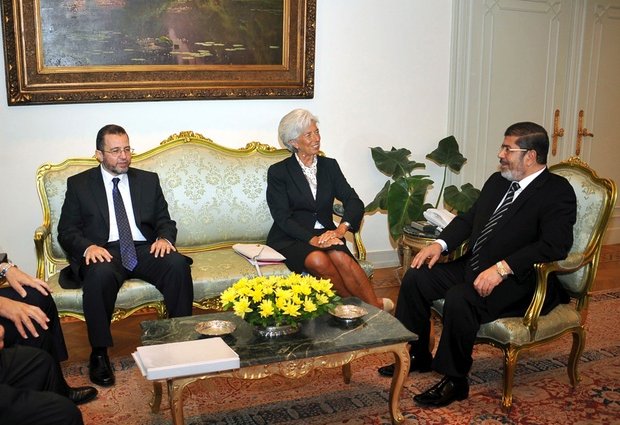
The IMF Executive Board was due to consider the program for Egypt on December 19, 2012. Once it was formally approved by the Executive Directors, as it was expected to be, the first tranche of the $4.8 billion loan would have been made available to Egypt immediately. However, on December 11 the Egyptian Minister of Finance Momtaz Al-Said requested a postponement of the IMF Board meeting “to give more time for social dialogue.”
Undoubtedly, the political turmoil in the country in the aftermath of President Mohammed Morsi’s recent decrees and the ongoing referendum on the constitution were important factors in Egypt’s decision. Once an IMF Board meeting has been scheduled, which means that the IMF management has signed off on a program, it can only be postponed at the request of the country. The IMF cannot unilaterally postpone a Board meeting based on political developments in the country, short of a collapse of the government that requested the program. In that case, the IMF management would withdraw the program until a new government is in place and agrees to the terms and conditions of the program.
So why did the Egyptian government request a “postponement”? A key pillar of the program was fiscal reform designed to reduce wasteful expenditures, including inefficient and excessive energy subsidies, and increase tax revenues by increasing the progressivity of income taxes and by broadening the general sales tax to eventually become a full-fledged value added tax. The aim was to reduce Egypt’s budget deficit from 11 percent of GDP in 2011/2012 to 8.5 percent of GDP in 2013/2014. As a first step the government announced on December 9 a series of tax measures. These included increases in sales taxes on a variety of consumer items, such as soft drinks, alcohol, cigarettes, mobile phone calls, and transportation. The government quickly realized that raising taxes in a political-charged environment was a mistake and President Morsi rescinded these tax measures less than 24 hours later.
These tax measures were “prior actions” for the program to be formally approved by the IMF Executive Board. That is, they had to be undertaken before the Board meeting on December 19. If a country cannot undertake the required prior actions, it can request a postponement of the Board meeting. This is presumably what led Finance Minister Al-Said to request the postponement. There are reports that the US played some role in getting the Egyptian government to ask for a delay, the implication being that the US would find it difficult to support the Egyptian case at the Board meeting. Being the largest shareholder in the IMF, US views obviously carry a large weight in any Board decisions, and the chances of any program going through without US support are very low.
The question is whether the Egyptian government is simply waiting for political tensions to subside before it will take the necessary policy actions on taxes and meet the IMF conditions, or whether it believes that tax increases are off the table. If the former, then it is a matter of finding an opportune time to reinstate the tax increases and then ask the IMF to reschedule the Executive Board meeting. But if it is the latter and taxes cannot be increased for political reasons, then it is more problematic and would necessitate a renegotiation of key parts of the program, specifically the fiscal component. If tax increases are no longer feasible either revenues would have to be found elsewhere, expenditures cut further, the fiscal deficit allowed to be larger, or more likely some combination of the three. A renegotiation of the program is almost guaranteed in this case and the timing of its completion is uncertain at best. There are press reports of a second round of negotiations on January 15, 2013, but this probably means when the negotiations will start, not when they will end.
There is a lot riding on the IMF program. Not only would Egypt receive $4.8 billion in direct financing from the IMF but also other financing, such as $500 million from the African Development Bank and a €5 billion European Union aid package, is contingent on an IMF program. Furthermore, the IMF loan is important for Egypt as a catalyst for economic reforms and as a signal of confidence for foreign investors.
Even within Egypt there are pressures from businessmen as well as some high-ranking Muslim Brotherhood officials to move ahead rapidly with an IMF loan so as to establish the economic pillars of recovery. If Morsi is seen to be backing away from the IMF and the conditionalities of the program, even the loyalists in the Brotherhood’s political arm, the Freedom and Justice Party, may question the decision. President Morsi will have to balance the populist pressures coming from the street on taxes and the economic reforms desired by Egyptian businessmen, among them members of the Muslim Brotherhood, and foreign investors.
Hopefully, President Morsi will be persuaded that the IMF loan with its conditions is in the best economic interests of the country and will take the necessary policy actions to ensure an early approval of the IMF program. The Muslim Brotherhood would certainly not relish being associated with the steadily worsening economic situation in Egypt and possibly even an economic crisis.
Mohsin Khan is a senior fellow at the Atlantic Council’s Rafik Hariri Center for the Middle East focusing on the economic dimensions of transition in the Middle East and North Africa.
Svetlana Milbert is assistant director of the Atlantic Council’s Rafik Hariri Center for the Middle East.
Photo: AP
Image: mohammed-morsi-christine-lagarde.jpg
